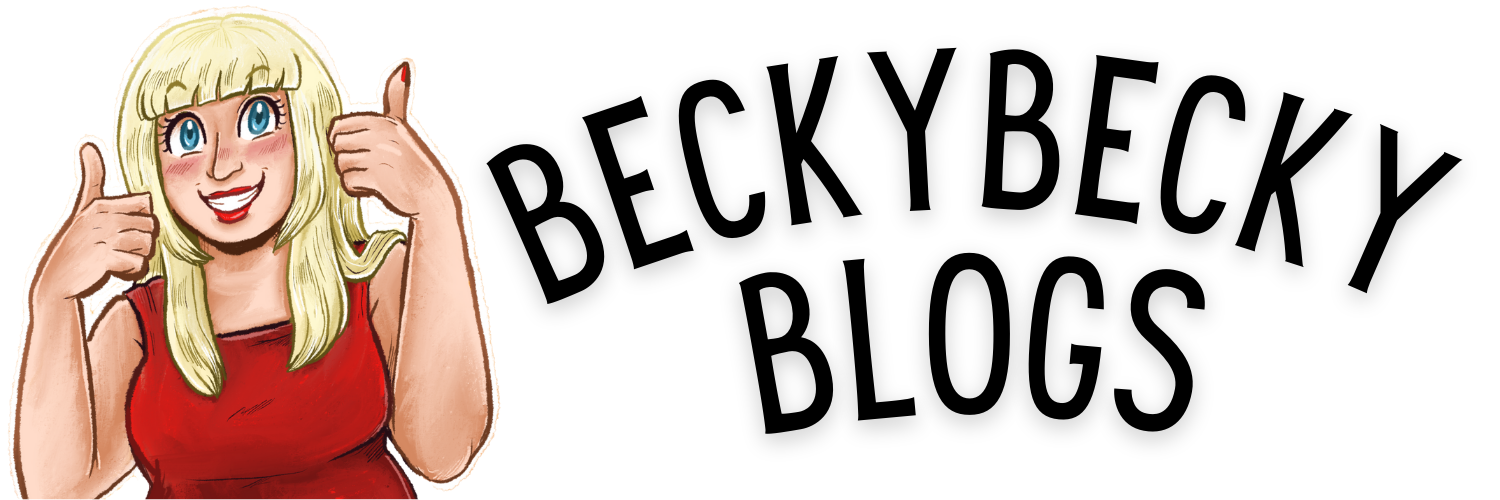Am I famous for press at megagames? I think I am.
My second ever megagame role was as the Head of World Media at the infamous original Watch The Skies. I went on to play press in the subsequent three London WTS runs, as well as four other games. Jim Walkman, the designer of WTS, amazingly gave me a pretty free reign to develop the press game as I saw fit. I was International Press Control for Urban Nightmare: State of Chaos. I also recently was invited to head up the press team at Dire Straits, the megagame ran at Connections UK, a professional wargaming conference in London.
I’ve oscillated between various points of view on how to run press best at a megagame. I’ve tried Twitter, print, and blogging. I’ve tried competing press teams, and collaborating ones. I’ve tried running it all on my own, and I’ve had a team of seven working with me. I’ve had complete newbie players, as well as veteran megagamers who hadn’t done press before.
I have played or controlled press ten times in total. And honestly, there’s still a lot about Press that I don’t know.
But Press is a crucial part to many megagames, particularly modern day and near future settings. It’s important enough to have been featured in my 7 Habits of Highly Effective Megagamers post.
So here are my views on how to incorporate Press best into your Megagame.
1. Press should be a player role.
It recently came up for debate whether press can be done by Control, and I’m firmly on the no side.
Control don’t have as much time to put into running the press as a dedicated player or team would. Control naturally get side-tracked by other issues within the games, and Press Control is also likely to be the first one cut if another Control can’t make it.
Additionally, Control sometimes know too much about the game. Part of the joy of Press, both in game and in the real world, is the organic way it comes across information and chooses what to highlight. If Control is running press, the worry is that it will be too “staged”.
Finally, there are players who LOVE Press (I know I’m one of them). Press players get a lot out of affecting the game in a very tangible way.
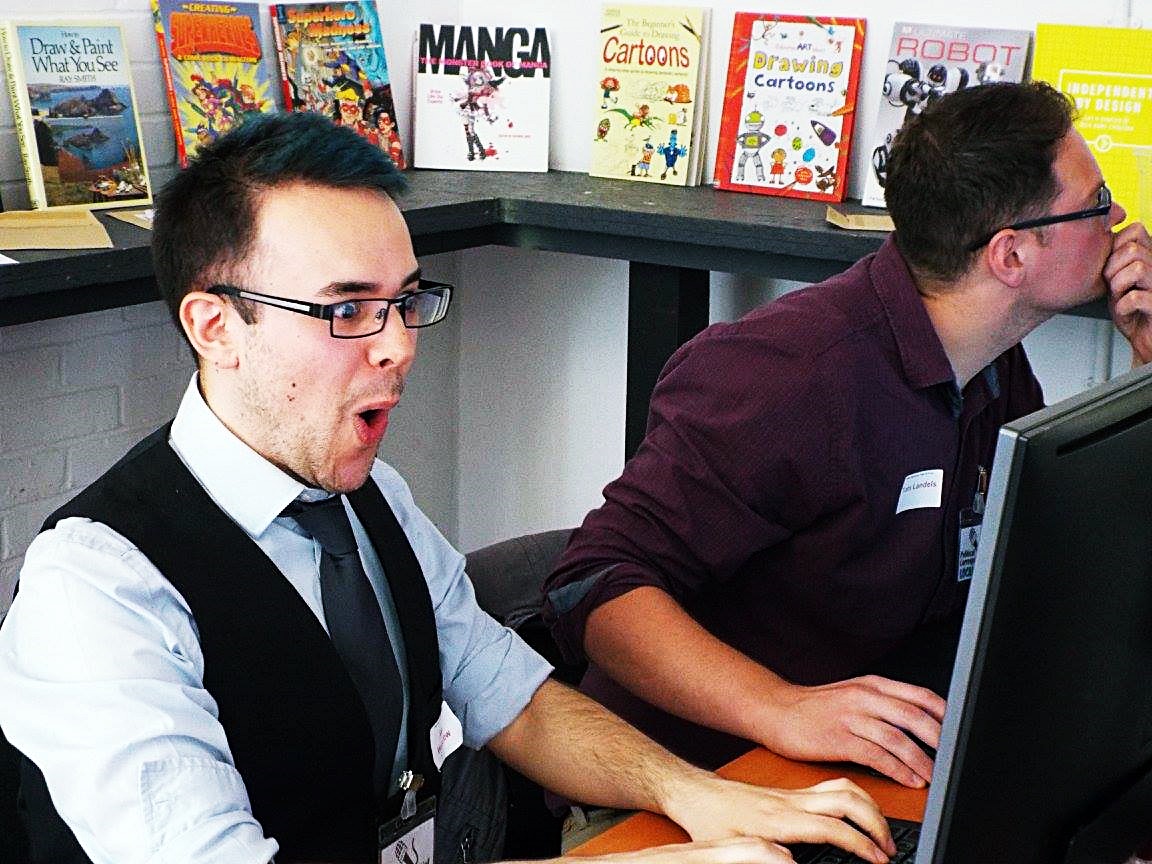
Image credit: Jim Wallman
2. Choose press players carefully.
Not everyone is suited to a press role. Obviously the role is best suited to players who have good writing skills. Players who struggle to type quickly or write clearly may not excel in the role. But that’s not the only caveat.
You sometimes get press players who are more keen to go talk to other players about what’s happening, but don’t write much content. This can work – if you have a computer based editor and a roaming journalist. But overall it can cause resentment within your press team, and can lead to some aspects of the game not being reported on.
Players who are prone to lying in character will want to bring that into the Press game, where it can be incredibly detrimental (you get enough fake news from the players!).
On the other hand, it’s a great place for newbie players, who may be reticent about putting themselves out their as characters but will be more than happy to make waves on paper.
3. The Editor should be experienced.
Okay, I mostly say this because I’ve been the experienced editor many many times. But the Editor does more than write stories – in fact, she often doesn’t write stories at all. She’s responsible for the logistics and making sure whatever system you’re using works properly. She’s responsible for working out what stories are key to the plot of the game, and which are filler that the players are telling you to keep themselves feeling important.
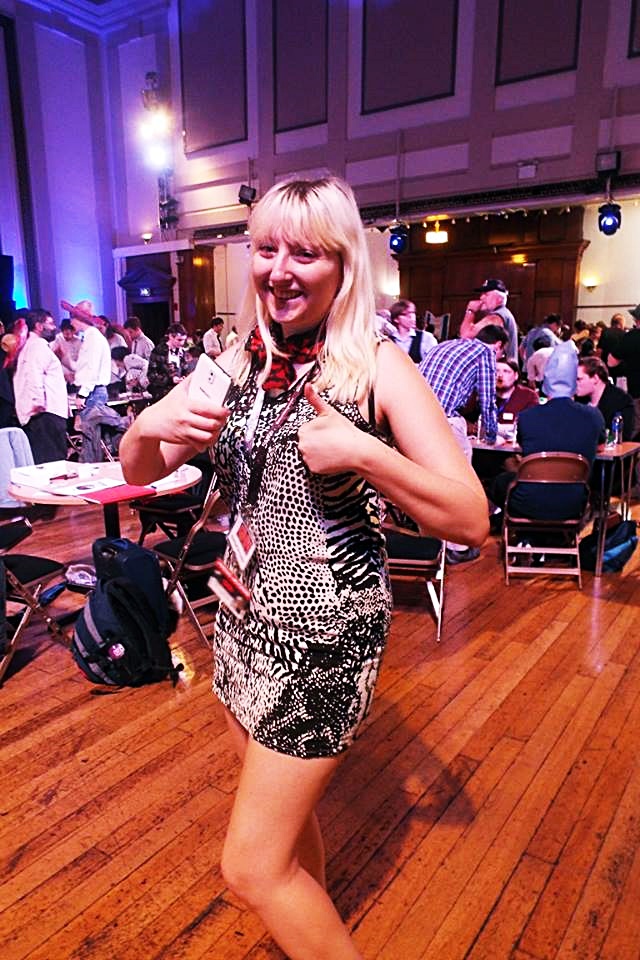
Image credit: Jim Wallman
It’s an option to sub in a “plumpire” (player-umpire) here. That’s often the role I’ve felt I had when playing Press at Watch The Skies. That way, you can feed information to the player before the game or during it, and trust that it will be communicated to the players in the best possible way. There’s even an argument to be made for giving the Press Editor control of the prestige tracker, if you have one – though she might be too busy for that.
If you don’t have an experienced press player in the team, be sure to have a control keeping an eye on them. It’s quite common for Press not to have a dedicated control, but it’s great if you can squeeze one in.
4. Bigger is always better.
A press team will expand their news to fit their available resources. In my first Watch The Skies, I was the only press player, and I published a full page issue every game turn.
But in subsequent games, when I’ve had a bigger team, I have no idea how I managed. Even in Urban Nightmare Redux, which was a similar size to that first game, the Press team was three people and we were rushed off our feet! I don’t think I’ve been in a single game where the press team felt over-resourced, and I’ve definitely seen many games that had too few press players.
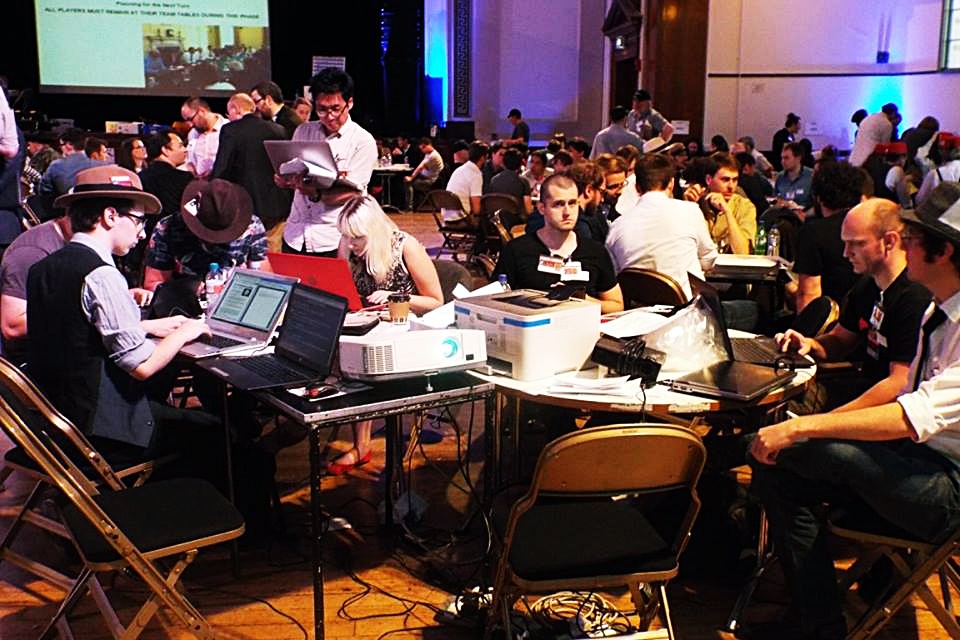
Image credit: Jim Wallman
As a guideline, I’d say the minimum press team size is 3. If you have more than 60 players, up it to 5.
5. Structure that Press team.
In terms of team structure, it’s definitely best to only have one united press team. Collaborating press players can work together to reduce the load, while competing players will be forced to report the same news as each other, which is just kind of a waste of time. Think of it this way – do you want the same news several times, or different news and more of it?
Personally, I find that dividing a press team into regions makes the most sense, because then they’ll get a familiarity with the players in those regions. But you might find that “conflicts” works best. At Dire Straits, there were 4 major conflicts that would be top of the news, and 4 floating press players, so I assigned them one each, and it all ran like clockwork!
One type of division that I don’t recommend is political vs military, or political vs crime. These are common on smaller press teams, but political news is a huge thing to cover across an entire game, and may cause that player to feel overloaded.
Either way, let players choose the roles within the press team that work best for the situation. Feel free to suggest, for example, that one player covers a certain topic or in-game location, but let them work out if it still makes sense to work it that way on the day.
One of the best ways to include conflict within a press team is by giving them certain opinions. Just making one player a democrat and another a republican is a great way to get a little internal struggle. But make sure your editor is neutral!
6. Not all press systems are created equally.
Right now, my favourite press system is a blog. I tend to use WordPress.
Granted, blogging has its faults. You need a projector (or multiple throughout the venue), and a good WordPress theme to display the news well, and players should ideally be familiar with the blogging back-end. But players can access it from their phone in an emergency. And it’s a built in record of the game, which is always fun to look back at.
Twitter is often stated as a good solution, and to be honest it’s not dreadful. But compared to blogging, the content is too short. It encourages sloppy and snappy reporting, which won’t capture the nuance of the game.
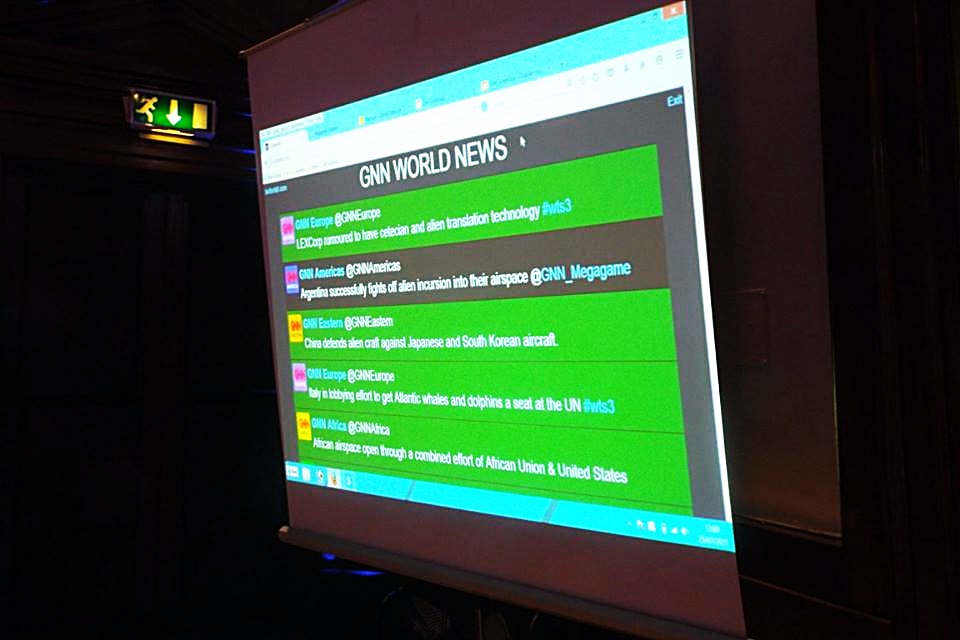
Image credit: Jim Wallman
Printing has long been the go-to press format. Printed papers are a great souvenir, and they capture the realness of the game in a way no other press system does. But it’s always fraught with technical difficulties, and means press players will spend some of the game tied up delivering the paper.
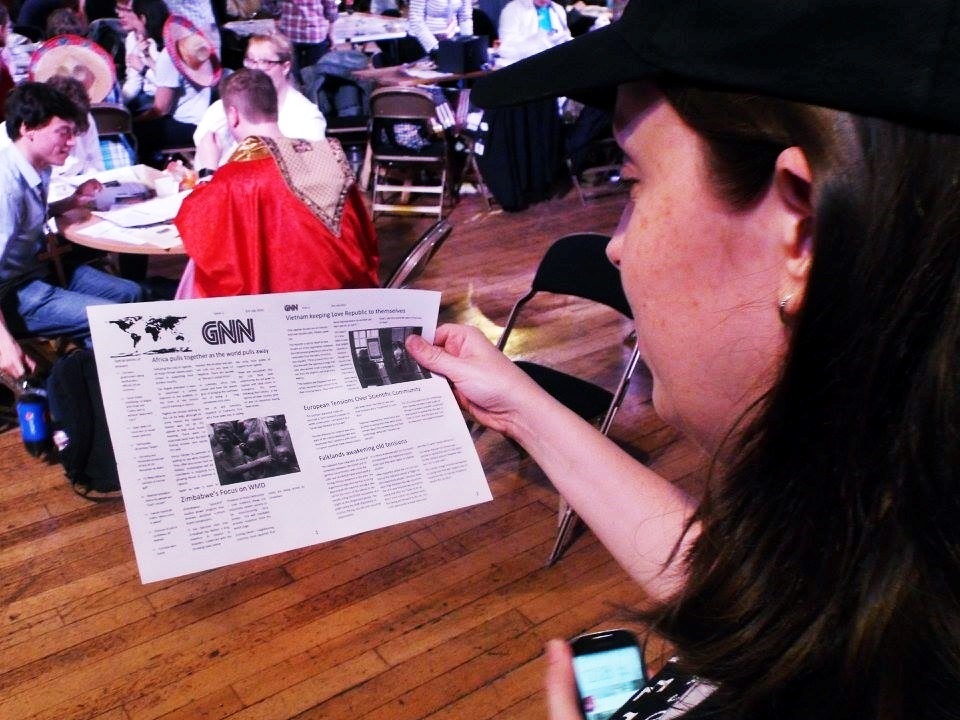
Image credit: Jim Wallman
Some games use the system of writing headlines on whiteboards, but for me this is the worst of all worlds – too short, not nuanced, too static, only visible in one part of the venue, and doesn’t form a lasting record for after the game.
Announcements are sometimes the only press system that makes sense in a setting, for example, historical games with bards. This isn’t always ideal – for example, it breaks up conversations, which really doesn’t work at some games. And announcements on their own aren’t enough, because if you miss them they’re gone forever. But I did really like the model they used at the Crisis in Elysium megagame, whereby there were announcements of the major headlines, as well as a website.
7. Preparation is key.
If Press players are spending the first turn getting to grips with the software, that’s time they’re not spending churning out articles!
Get your press system up early, and get players practising on it. Encourage them to write some pre-game fluff pieces. Feel free to release turn one Events to them, so they can get a start on writing.
Also, make sure every single member of your press team has a laptop. It’s common for press players to turn up with phones, but that massively slows down writing speed. You try writing a proper article on your smartphone! Repeat it several times in pre-game emails, and bring as many laptops with you as you can get your hands on – just in case!
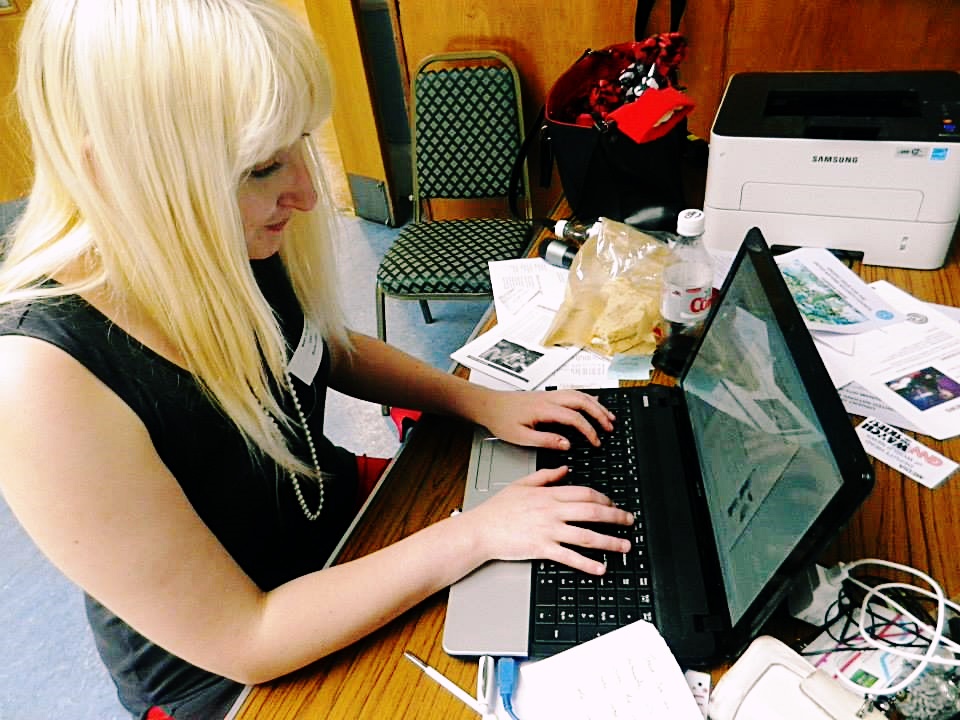
Image credit: Jim Wallman
8. Remember a back up.
Technology is always subject to failing at a crucial moment. I don’t think I’ve ever been at a megagame where the tech worked consistently all the way through! Make sure you have a back up printer (if you’re printing), and that there’s a system you can use to distribute the news if your screen goes down.
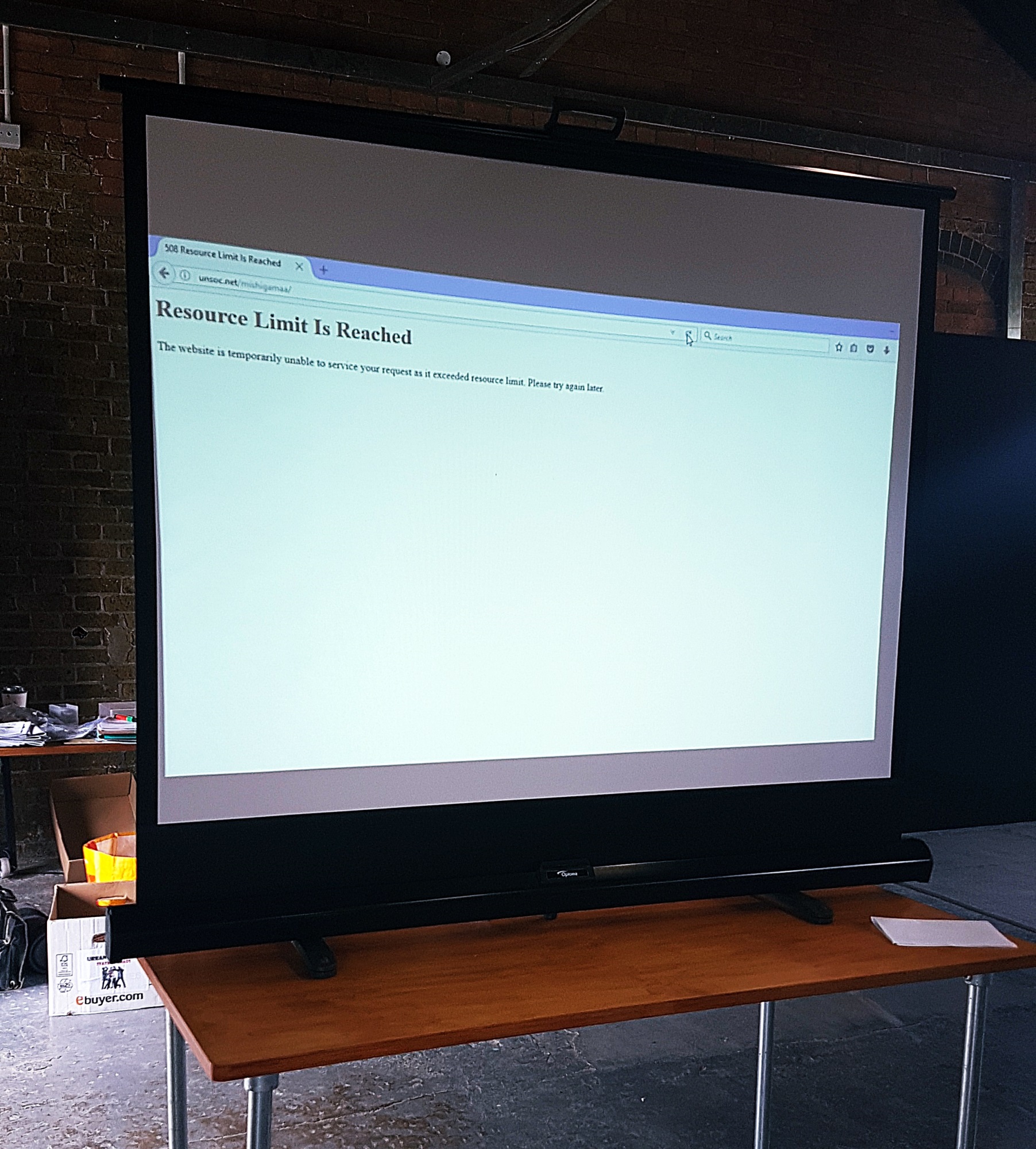
My troubles at Urban Nightmare: State of Chaos are surely infamous by now. An unexpected fault occurred when 500 players tried to access the website at the same time. Not something I could have planned for, realistically. So I made sure to send out a printable template that they could project at their venue, if the website fell over completely.
9. Thank your press players.
It’s a bit of a pet peeve, but Press Players often get left out in game wrap-ups.
They definitely don’t need a talking slot. If they’ve been playing it right, they’ve had more than enough opportunity to say what they think. But remember to thank them – they’ve been working damn hard.
Conclusion
Press is an integral part of lots of megagames. It creates a sense of real world impact that is often lost in megagames. It calls players to account for their actions. And, most key, it helps spread the information about what is actually happening in different parts of the game to the rest of the players.
Lots of people run press in lots of different ways, and there isn’t one definitive BEST way to do it. But there are a lot of bad ways to do it, and I hope this blog will help you avoid some of the pitfalls.
I have lots of different Press templates – both for online and print – that I’m happy to share with people who are interested. I can also recommend tools to use to display Twitter best, and plugins that will auto-refresh your WordPress blog. Just pop me a message if you’re interested in hearing more.
And if you ever need an experienced megagame press editor 😉 I’m your girl.
How have you used Press at your megagames? Do you have any tips or tricks that I haven’t included?
